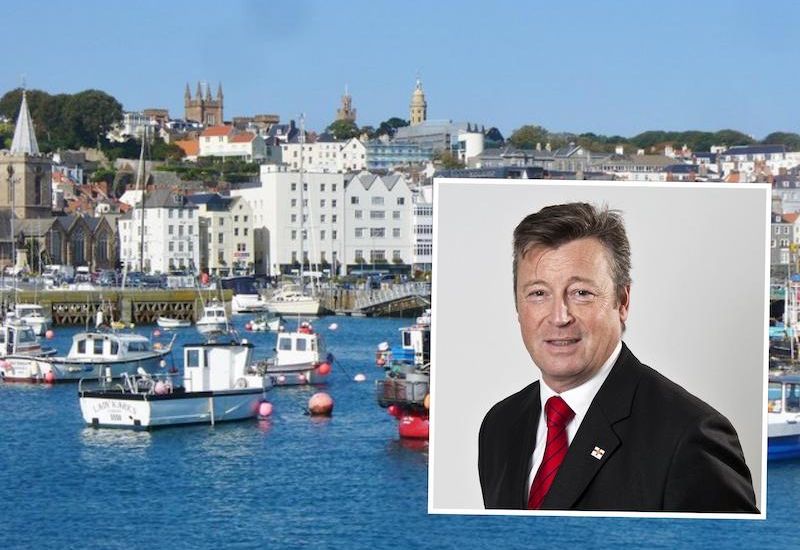

A convincing case for why the public should have access to a beneficial ownership register has never been made, according to one of Guernsey's top finance industry finance industry representatives.
Dominic Wheatley, the Chief Executive of Guernsey Finance, said he did not believe a new political move in the Crown Dependancies to take steps towards opening up their registers would truly lead to anyone having access 'through the internet'.
Rather he expects it to only become marginally accessible, because there is a need to balance people wanting 'legitimate privacy and illegitimate desire for secrecy'. In an interview with Express, Mr Wheatley explained how he thought when the States were developing the legislation to make the register public, they would strike this balance, leaving us with something only partially public.
This all comes as the States announced alongside Jersey and the Isle of Man that it would be working toward making its beneficial ownership register of companies available to the public. Deputy Gavin St Pier said the island was doing this as it was becoming an 'international norm', as it has been facing pressure from the UK for some time now to make a move similar to this.

The States have committed to three deadlines: 2020 - develop infrastructure for international authorities to access register, 2022 - open it up to the business world for due diligence purposes, 2023 - produce proposals on how to make it public.
Good to see Guernsey, Jersey and Isle of Man acknowledge the need for public registers of beneficial ownership. This means greater transparency & less tax evasion. However, concerns remain - particularly on timing. These must be addressed before we can endorse their proposals.
— David Davis (@DavidDavisMP) 19 June 2019
Mr Wheatley said Guernsey already had a 'genuinely world leading' register of beneficial ownership - but one that is only available to law enforcement and tax authorities - and therefore it would not become any more 'secure' of a jurisdiction by going public.
"The first thing is that this isn't a change of policy - Guernsey has had a long standing commitment to being right in the main stream of good practice, in terms of international financial services. Some time ago the island alongside the other two CDs made a reference to staying in line with the principals of AMLD5 [the fifth European anti-money laundering directive] as they were implemented and as a universally accepted interpretation of those principals became clear. This is what that is," he said.
"All that really happened in this was to reiterate that and confirm that policy, and to therefore mirror the implementation timetable of AMLD5. What we have said is that we will run alongside that and that we will continue to be a good global corporate citizen alongside all of our financial service partners in combatting unacceptable tax practice and in applying the very highest levels of transparency and regulation."
Guernsey, Jersey and the Isle of Man have announced steps regarding each jurisdiction’s central register of beneficial ownership information of companies and how they will move towards developing international standards of accessibility and transparency in the coming years.
— Noe Vicca (@NoesDailyTaxTip) 1 July 2019
However while Deputy St Pier in his announcement said Policy & Resources will work toward a deadline of January 2023 to produce proposals on how to make beneficial ownership data accessible to the public, being 'mindful of any legitimate constraints on doing so', Mr Wheatley said he thought it was 'extremely unlikely' the end result would be a register totally open to anyone.
He said what Guernsey currently had was one of, if not the best, BO register in the world, and argued a case had never been made for why that information should be put in to the public. He said in his view, there was no way what Guernsey currently has would just be opened up for anyone to see.
UK Jersey Guernsey & Isle of Man forced into publishing public beneficial ownership register under EU anti money laundering rules https://t.co/aem9OFe35u pic.twitter.com/3sh6vW53xn
— Richard Asquith (@Richard_Asquith) 19 June 2019
But is there a threat to what Guernsey can offer to potential clients of the financial services industry, and could a public register be damaging to business? According to Mr Wheatley, the answer is maybe, but probably not. That though, is only because he believes Guernsey will be 'sensible' enough to come up with a 'public' register which keeps everyone happy.
"Amateur scrutiny is potentially damaging because a loss of privacy is potentially damaging. Privacy has been stripped away in very large measures, but every single oppressive regime in history have wanted to gather large amounts of information about its subjects. We keep being told data is power and yet we also keep being told that we need to make everything about us public. There are dangers in this new world where everything is expected to be legitimately public.
"On the other hand, do I think there is a danger to Guernsey? No, because I think Guernsey will come up with a legitimate balanced solution to cover both sides.
"This is the difference between legitimate privacy and illegitimate desire for secrecy. We are very firm on the respecting of proper privacy but rejecting those who seek to be secretive for nefarious purposes. So nothing that we do and nothing that we will do will enable people to avoid the legitimate scrutiny of the proper authorities, but there is a perfectly proper reason why people would not expect their private affairs to be in the public domain.
I am vehemently opposed to public registers of beneficial owners. They are dangerous. I will NEVER advice another client to setup in one of these jurisdictions, and I know many other advisors doing the same. #InternationalTax #ChannelIslandsareobsolete https://t.co/EvEr4emTAW
— Jimmy Sexton, LL.M. (@JimmySextonLLM) 27 June 2019
"Public scrutiny and media scrutiny plays no significant role in the fight against money laundering or improper tax practice. The key thing is making the information available to those responsible for scrutinising the proper affairs of individuals and corporations, and indeed security.
"For me, the proper people who need to understand about people's tax affairs are tax authorities, and our register is available to them. I fail to see what anyone else accessing that is actually going to contribute in terms of tax security.
"What we do is focus on what is the objective - to counteract money laundering and provide security, and to make sure there is proper scrutiny from the tax authories. That is the objective. If NGOs and the public and politicians feel that they have a role in the those objectives I would like to hear what it is, because it is not obvious to me."
Today the #IsleofMan Government - along with the States of Guernsey and the Government of Jersey - have committed to changes in the accessibility and transparency of our central registers of beneficial ownership information ????https://t.co/WQBrK15QJR @GovJersey @Govgg #IOM #Manx
— Howard Quayle (@HowardQuayleMHK) 19 June 2019
When putting this legislation together, Mr Wheatley said he wanted the government to consult the industry and think carefully about the consequences of whatever it did: "It should be paying proper attention to those seeking greater levels of transparency and it should be paying proper attention to those who are seeking good levels of discretion and privacy for their clients. It is the job of our politicians to strike that balance and to come forward with policies that meet the legitimate aims of both sides."
Pictured top: Dominic Wheatley, Chief Executive of Guernsey Finance.
Comments
Comments on this story express the views of the commentator only, not Bailiwick Publishing. We are unable to guarantee the accuracy of any of those comments.